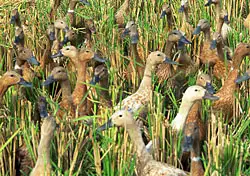
Like foot-and-mouth disease and SARS before it, avian flu has made world travelers skittish. You need not cancel your travel plans, however. As on any vacation, exercising caution and using common sense can help ease your fears.
“What people need to remember is that this is still a bird disease,” stated Dave Daigle, spokesperson for the Centers for Disease Control and Prevention (CDC). With proper planning, preventive care, and knowledge of possible health risks, you can still have a safe, enjoyable vacation.
What areas are of concern?
Currently, human cases of avian flu have been found predominantly in Cambodia, Indonesia, Thailand, and Vietnam. Travelers should exercise caution in these and other Asian countries, such as China and Laos, and stay informed about other regions where infected birds have been documented. To see if the area you want to visit has been affected by avian flu, check listings on the CDC website or the World Health Organization (WHO) website. “Be savvy about where you’re going,” noted Daigle, “and check advisories” to assess the risks in the area you’re visiting.
What precautions should you take?
Pre-departure
The CDC recommends taking the following steps:
- Check health information and advisories for the area you will be visiting
- Put together a travel health kit with basic first aid supplies
- Find health care resources available at the destination
- Call your health insurance provider to inquire about what’s covered or to purchase additional insurance specifically for your trip
- Check your vaccinations and get up-to-date shots, preferably four to six weeks before departure
“The CDC will have shots information for specific countries,” noted Daigle, so you’ll easily be able to find out what you need. And you may also want to take extra precautions for the upcoming winter months. “Remember that it’s also season for the regular flu, and getting a flu shot is advisable,” Daigle recommended.
Post-arrival
Once you’re at your destination, exercise caution. “Avoid live or wet markets,” advised Daigle. “You may see species of birds in cages, raw meat hanging—if those are handled, wash hands immediately. Be careful in areas where they raise poultry, or if you come into contact with poultry workers. If you eat poultry in-country, it should be fully cooked.”
General care and common sense cannot be overemphasized. “Avoid those who are sick, and wash hands frequently,” Daigle stressed. If you do get sick, contact the destination’s American embassy for assistance.
Upon return
Monitor your health for 10 days, advises the CDC. “Go to the physician immediately if you return and show symptoms of being sick,” added Daigle. Make sure your doctor knows where you traveled, if you came into contact with poultry, and your exact symptoms so a test for avian influenza can be administered.
What other resources are available?
If you still have questions about your upcoming trip, you can find up-to-the-minute information on avian flu and its risks on the following websites:
- CDC Avian Flu website
- Google avian flu news alerts
- WHO Avian Flu website
- State Department list of American embassies and consulates
- State Department list of doctors and hospitals abroad
Get informed about the risks, take precautions (wash those hands, then wash again), and avoid contact with birds, uncooked poultry, and bird workers. Above all, be sensible both in planning your trip and your behavior once you’ve arrived.
We hand-pick everything we recommend and select items through testing and reviews. Some products are sent to us free of charge with no incentive to offer a favorable review. We offer our unbiased opinions and do not accept compensation to review products. All items are in stock and prices are accurate at the time of publication. If you buy something through our links, we may earn a commission.
Top Fares From Columbus, OH
Today's Top Travel Deals
Brought to you by ShermansTravel
Shop and Save with Country Inns...
Patricia Magaña
 Hotel & Lodging Deals
Hotel & Lodging Deals
$229 -- Chicago: Discounted Rates and...
Francesca Miele
 Hotel & Lodging Deals
$229+
Hotel & Lodging Deals
$229+
$188 -- Honolulu: Save on Oceanview...
Abigail Lamay
 Hotel & Lodging Deals
$188+
Hotel & Lodging Deals
$188+



